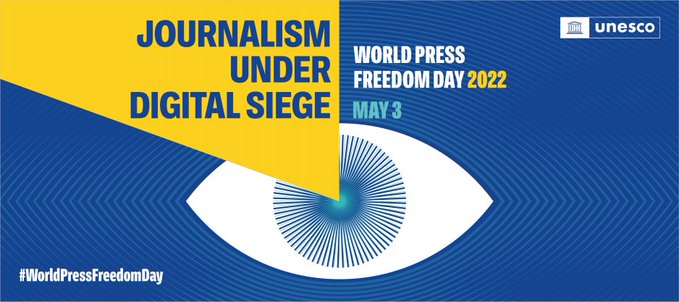|
Getting your Trinity Audio player ready…
|
The National Association of Freelance Journalists (NAFJ) today joined the rest of the world in commemorating World Press Freedom Day (WPFD) and condemned acts meant to stifle the free flow of information.
This year’s theme is “Journalism under digital siege.”
NAFJ said the event, which is marked yearly on May 3, presents an opportunity for journalists and various media stakeholders to take stock of advancement toward media freedom, free speech, media plurality, and diversity.
WPFD was proclaimed by the UN General Assembly in December 1993, following the recommendation of UNESCO’s General Conference. Since then, on 3 May, the anniversary of the Declaration of Windhoek is celebrated worldwide as WPFD.
“Today acts as a reminder to governments of the need to respect their commitment to press freedom. It is also a day of reflection among media professionals about issues of press freedom and professional ethics. It is also an opportunity to celebrate the fundamental principles of press freedom, assess the state of press freedom throughout the world, defend the media from attacks on their independence, and pay tribute to journalists who have lost their lives in the line of duty.
“As the 2022 theme highlights, the profession of journalism is threatened by a myriad of state machinations including bad legislation bent on stifling the free flow of information. the WPFD, therefore, gives us the window to spotlight the multiple ways in which journalism is endangered by surveillance and digitally-mediated attacks on journalists, and the consequences that this has on public trust in digital communications,” Lynette Manzini, the Chairperson of NAFJ said in a statement today.
The latest UNESCO World Trends Report Insights discussion paper “Threats that Silence: Trends in the Safety of Journalists,” highlights how surveillance and hacking are compromising journalism.
Surveillance can expose information gathered by journalists including from whistleblowers and violates the principle of source protection, which is universally considered a prerequisite for freedom of the media as enshrined in United Nations (UN) Resolutions.
Surveillance harms the safety of journalists by disclosing sensitive private information, which could be used for arbitrary judicial harassment or attack.
There is a growing global push encouraging more transparency regarding how Internet companies exploit citizens’ data; how that data informs predictive models and artificial intelligence and enables amplification of disinformation and hatred.
This was underlined in the Windhoek+30 Declaration call for technology companies to work to ensure transparency in relation to their human and automated systems.
Locally, as we commemorate WPFD 2022, NAFJ commended the Government of Zimbabwe for making significant strides in liberalising the broadcasting sector by the recent licensing of 14 community radio stations which is a milestone in promoting pluralism.
“We urge the government to ensure these new media players are given the necessary financial and technical support for their sustainability. However, NAFJ notes with regret that the working environment for journalists remains constrained, particularly when they are subjected to harassment and brutality at the hands of state security agents. Journalists and media practitioners continue to be arrested and detained in police custody on flimsy charges, and this must stop.
“A case in point was the arrest of female freelance journalist, Mary Mundeya on January 12, 2022, while covering a demonstration by teachers at the National Social Security Authority (NSSA) offices in Harare. Mundeya was detained at Harare Central Police Station for about two hours before she was released without charges. We call upon the police, army, and other state security agencies to respect journalists and allow them to freely execute their professional duties,” NAFJ said.
The media organisation added that with the Covid-19 pandemic still lurking, sharing unverified information during these trying times is potentially dangerous, unhealthy, and makes our lives more confusing.
NAFJ encouraged its membership to play their part to end the Infodemic by articulating well-researched and sourced news articles and appealed to all journalists to be front liners in disseminating the truth.
The United Nations in Zimbabwe Spokesperson, Sirak Gebrehiwot weighed in by saying the day aims to reunite policymakers, journalists, media representatives, activists, cybersecurity managers, and legal experts to develop concrete solutions to address threats posed by increased surveillance to press freedom and privacy.
Mlondolozi Ndlovu, the Acting Director of the Zimbabwe Association of Community Radio Stations (ZACRAS) said as the world celebrates World Press Freedom Day, it is crucial to have conversations on why a free press still matters in the digital age.
“A free press is a vital organ of a democratic society. In order for us to make informed choices when we pick our representatives or vote on certain issues, we need to know what’s actually going on. A free press can give us a straight story on issues, policies, and events because it’s not under the influence of the government or big business.
“Another function of a free press is that of a watchdog. A free press must not be beholden to the government or other entities, or work in fear of them, a free press can give unvarnished reporting on politicians and others. A free press must expose corruption, patronage, and embezzlement by the ruling elites. These are the basic normative roles of the press that ought to be respected even in the digital press. Happy Press Freedom day to all my colleagues in the media!” Ndlovu added.
